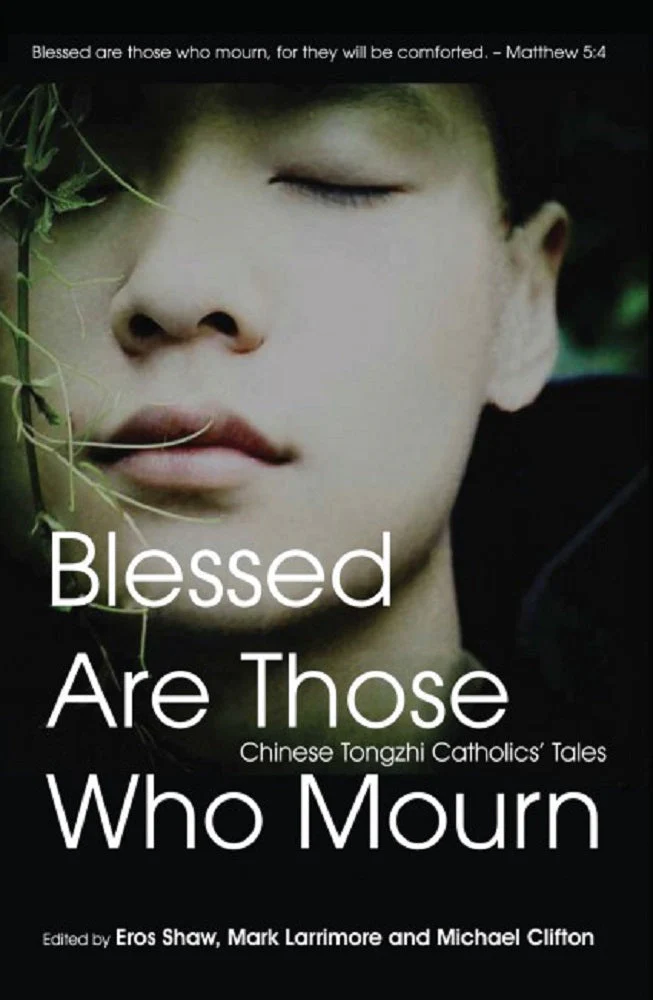"Cross a river walking on the stones." Be LGBT+ Catholics in China
Dialogue by Alessandro Previti with Eros Shaw, a young Chinese Catholic Gay, made in the context of Cornerstone Project*
Eros Shaw is a young Catholic LGBTQ+ in China, where he achieved a master's degree in theology, which he tells in the book "BLESSED Are Those Who Mourn: Chinese Tongzhi Catholics' Tales"(Blessed are those who cry: tales of Chinese Tongzhi Catholics, publisher Sird, 2022) his path of Catholic gay started in 2009 when he entered "In contact with other gay Catholics through the internet, but they were sporadic interactions. We had no regular exchanges and nobody would have ever imagined to create an organization. Fear and geographical distances were too large obstacles. That year I moved to Beijing (China) for work", There he knew a"dozen of LGBT Christians of various denominations", Was born like this"The idea of seeing us regularly to support each other. I was the only Catholic present and I would have stayed for some time".
Today it is part of China Rainbow Witness Fellowship and of China Catholic Rainbow Community and the Global Network of Rainbow Catholics (GNRC). We asked him to help us understand what it means in China to be a LGBT+Catholic.
In China, LGBT identity is faced differently than the West, both culturally and politically. How does this reality live a LGBT Catholic person? What pressures derive from the family, society and the Church?
I think there are some cultural differences, but the main differences concern the times. The pressure linked to marriage and procreation, which in the past LGBT people in Europe and America faced, today may no longer be necessary, while Chinese LGBT people have yet to deal with it.
Between 2008 and 2018, Chinese society also benefited from the conquests of the LGBT movement in Europe and America. The movement of LGBT Christians was also active and our community has formed and developed in those years. However, after 2018, the situation worsened drastically.
Faced with the drop in births, society and families have targeted LGBT people again. The Chinese Church has too many issues to be addressed and at the moment cannot deal with LGBT issues. Therefore, LGBT Catholic people in China can only share information and mutual support through chat groups.
Confucianism emphasizes social harmony and respect for the family. Do you believe that this influences the perception of LGBT people in the Chinese Catholic Church? Have you ever felt the duty to "not create disorder" for the good of the community?
Absolutely. The catechism of the Catholic Church states in paragraph 2357 that "The homosexual acts are intrinsically disordered."This is logically coherent: not having children is intrinsically disordered and creates disharmony in the family. The Chinese have the concept of "harmony" in the blood, therefore, even if personally I don't feel this duty, I think many LGBT people feel it.
Is it true that Christian churches in China often operate in a delicate balance between adhesion to doctrine and adaptation to the local context? Have you ever met priests or religious willing to discuss LGBT realities, even in private?
Location is a principle that Chinese Catholicism has always given importance. Figures like Matteo Ricci and Xu Guangqi are often considered pioneers and respected both in the Church and in society. However, the LGBT issues do not seem to be among the contextualizable ones. Paradoxically, some scholars believe that traditional Chinese society was not so severe towards homosexuality (as some scholars would also have supported regarding the traditional Arab society). It is only with the introduction of Christianity that the homosexual community has been treated hard.
I met some religious and nuns willing to accompany the LGBT community in private. They also shared their experiences in the book BLESSED Are Those Who Mourn - Chinese Tongzhi Catholics' Tales, that I edited. On the contrary, I noticed that some religious with homosexual orientation avoid accompaniment and try only to satisfy their personal desires (I think it is a common phenomenon).
Do the officially recognized Catholic churches have room for dialogue on LGBT issues, or is the theme considered too sensitive? Have you ever heard priests or religious in China speak in favor of LGBT people? Was there any consequences?
There is no space. However, in recent years, with Pope Francis' different statements on this issue, some Catholic accounts on WeChat in China have expressed support for LGBT people, but have been attacked.
I heard that the bishop of Hong Kong is interested in discussing the matter. I sent him my book through a person, but so far I have not received any feedback. I know it's very difficult.
Have you had experiences with underground or unofficial Christian communities? If so, are they more open or more rigid about the inclusion of LGBT people?
Yes. However, their priority is not the LGBT issue, but their own survival.
Many young people in China, even non -believers know LGBT culture through social media and global influences. Is this new generation impacting the churches? Is a change in religious speech on gender identity and sexual orientation emerge?
This phenomenon is real. I saw young catechumens, in several catechesis courses, question priests on LGBT issues. Priests often do not know how to respond and just underline that this is the position of the Church. However, I believe that this type of influence is underway, as happens in the universal Church.
Are there parallels between the situation of LGBT people and that of religious minorities in China? How do they face this double marginalization LGBT believers?
Yes, absolutely. LGBT Catholic people face this double marginalization every day and, although reactions vary, live under a strong pressure. The dozens of stories collected in BLESSED Are Those Who Mourn They tell their real experiences.
Many Chinese LGBT communities find refuge in cultural or digital spaces rather than in religious institutions. Could the Catholic Church offer support without conflicting with dominant culture?
People are needed to start doing it and leader who are brave and wise, but it is not happening in the current situation.
If I could speak directly with the Pope or with the leaders of the Chinese Catholic Church, what would you ask?
I would say to the Pope that I am grateful to him for his kind words towards LGBT people in recent years, I understand his difficulties and please for him. If possible, I would like to invite him to read the book BLESSED Are Those Who Mourn, which was delivered to him through the Global Network of Rainbow Catholics (GNRC) on October 25, 2023.
To the leaders of the Chinese Catholic Church I would say to remember that they are shepherds and should be open to everyone.
Can you tell us your story? You can find here
* The Cornerstone Project, coordinated byLa Tenda di Gionata, wants to collect and offer testimonies and reflections to multiple voices on the welcome of LGBT+ Christians and their families in our Christian communities (Catholic and Evangelical). What are the challenges, the possibilities and ways of which it can be made? What are the problems he poses and the possibilities he opens? How theology and study of the Bible can help us create corner stones with which to build more inclusive Christian communities, so that "The stone that the builders rejected"become“corner head"(Luke 20: 17-18). The Cornerstone project is also supported by: theFaith, Gender and Sexuality Commission of the Baptist, Methodist and Waldensian churchesand fromItalian Evangelical Youth Federation(Fgei) and some Christian realities of different parts of the world:Drachma Malta, Global Network of Rainbow Catholics, China Catholic Rainbow Community(China) eRainbow Home of Seven Sisters – RHOSS(India). The 2025 edition of the Cornerstone project is co-financed by the bottomEight Per Thousandof the Valdese Church (OPM/2024/47240)







